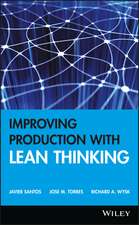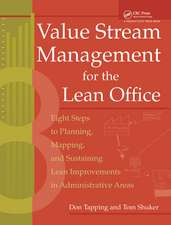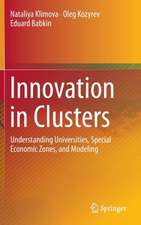Co-Evolution of Standards in Innovation Systems: The Dynamics of Voluntary and Legal Building Codes: Contributions to Management Science
Autor Stefan N. Grösseren Limba Engleză Hardback – 28 iul 2012
This book creates a feedback-rich simulation model for analyzing the effects of different administrative policies on energy demand, the improvement of energy efficiency by means of building codes, and reductions in the greenhouse gas emissions. The dynamic model can contribute substantially to the discourse on energy policies and guide effective administrative interventions. The book will be a valuable resource for officials in the public energy administration, as well as researchers in the areas of innovation, diffusion processes, co-evolution, standardization, and simulation modelling.
| Toate formatele și edițiile | Preț | Express |
|---|---|---|
| Paperback (1) | 944.51 lei 6-8 săpt. | |
| Physica-Verlag HD – 9 aug 2014 | 944.51 lei 6-8 săpt. | |
| Hardback (1) | 948.92 lei 6-8 săpt. | |
| Physica-Verlag HD – 28 iul 2012 | 948.92 lei 6-8 săpt. |
Din seria Contributions to Management Science
- 18%
 Preț: 727.18 lei
Preț: 727.18 lei - 20%
 Preț: 565.28 lei
Preț: 565.28 lei - 24%
 Preț: 746.28 lei
Preț: 746.28 lei - 24%
 Preț: 829.10 lei
Preț: 829.10 lei - 18%
 Preț: 1113.09 lei
Preț: 1113.09 lei -
 Preț: 359.99 lei
Preț: 359.99 lei - 20%
 Preț: 875.44 lei
Preț: 875.44 lei - 20%
 Preț: 753.39 lei
Preț: 753.39 lei - 20%
 Preț: 938.85 lei
Preț: 938.85 lei - 24%
 Preț: 847.68 lei
Preț: 847.68 lei - 15%
 Preț: 697.82 lei
Preț: 697.82 lei -
 Preț: 282.19 lei
Preț: 282.19 lei - 15%
 Preț: 694.04 lei
Preț: 694.04 lei - 18%
 Preț: 913.44 lei
Preț: 913.44 lei - 24%
 Preț: 691.05 lei
Preț: 691.05 lei - 18%
 Preț: 952.89 lei
Preț: 952.89 lei - 18%
 Preț: 948.47 lei
Preț: 948.47 lei - 15%
 Preț: 585.69 lei
Preț: 585.69 lei - 18%
 Preț: 949.23 lei
Preț: 949.23 lei - 18%
 Preț: 957.62 lei
Preț: 957.62 lei -
 Preț: 384.86 lei
Preț: 384.86 lei - 15%
 Preț: 653.65 lei
Preț: 653.65 lei - 15%
 Preț: 646.43 lei
Preț: 646.43 lei -
 Preț: 379.86 lei
Preț: 379.86 lei - 18%
 Preț: 952.26 lei
Preț: 952.26 lei - 15%
 Preț: 644.82 lei
Preț: 644.82 lei - 18%
 Preț: 1836.01 lei
Preț: 1836.01 lei - 15%
 Preț: 642.68 lei
Preț: 642.68 lei - 15%
 Preț: 644.95 lei
Preț: 644.95 lei - 15%
 Preț: 643.48 lei
Preț: 643.48 lei - 15%
 Preț: 648.74 lei
Preț: 648.74 lei - 18%
 Preț: 948.29 lei
Preț: 948.29 lei -
 Preț: 381.43 lei
Preț: 381.43 lei - 15%
 Preț: 640.06 lei
Preț: 640.06 lei - 15%
 Preț: 638.24 lei
Preț: 638.24 lei - 18%
 Preț: 956.33 lei
Preț: 956.33 lei - 18%
 Preț: 1390.26 lei
Preț: 1390.26 lei -
 Preț: 386.22 lei
Preț: 386.22 lei - 15%
 Preț: 647.40 lei
Preț: 647.40 lei -
 Preț: 387.58 lei
Preț: 387.58 lei - 15%
 Preț: 646.11 lei
Preț: 646.11 lei - 15%
 Preț: 637.59 lei
Preț: 637.59 lei - 15%
 Preț: 645.60 lei
Preț: 645.60 lei - 20%
 Preț: 648.44 lei
Preț: 648.44 lei - 20%
 Preț: 325.95 lei
Preț: 325.95 lei - 15%
 Preț: 641.71 lei
Preț: 641.71 lei - 15%
 Preț: 640.06 lei
Preț: 640.06 lei
Preț: 948.92 lei
Preț vechi: 1157.22 lei
-18% Nou
Puncte Express: 1423
Preț estimativ în valută:
181.60€ • 188.89$ • 149.92£
181.60€ • 188.89$ • 149.92£
Carte tipărită la comandă
Livrare economică 12-26 aprilie
Preluare comenzi: 021 569.72.76
Specificații
ISBN-13: 9783790828573
ISBN-10: 3790828572
Pagini: 296
Ilustrații: XXVIII, 268 p.
Dimensiuni: 155 x 235 x 25 mm
Greutate: 0.54 kg
Ediția:2013
Editura: Physica-Verlag HD
Colecția Physica
Seria Contributions to Management Science
Locul publicării:Heidelberg, Germany
ISBN-10: 3790828572
Pagini: 296
Ilustrații: XXVIII, 268 p.
Dimensiuni: 155 x 235 x 25 mm
Greutate: 0.54 kg
Ediția:2013
Editura: Physica-Verlag HD
Colecția Physica
Seria Contributions to Management Science
Locul publicării:Heidelberg, Germany
Public țintă
ResearchCuprins
Forewords.- Part I: Stage and Background.- Part II: Scientific Contributions.- Part III: Closing.- About the Author.
Notă biografică
Stefan N. Grösser is a professor of Strategic Management at the Bern University of Applied Sciences, Switzerland and a lecturer for System Dynamics at the University of St. Gallen, Switzerland. He has also served as a visiting scholar to the System Dynamics Group at the Sloan School of Management, Massachusetts Institute of Technology, and has completed numerous degrees: in Business Administration and Economics at the University of Stuttgart, Germany, in System Dynamics at the University of Bergen, Norway, and in Management at the University of St. Gallen, Switzerland. His research interests include strategic management, diffusion management, business models, mental models, and simulation methodology. He has published in the journals European Journal of Operational Research, System Dynamics Review, and Systems Research and Behavioral Science.
Textul de pe ultima copertă
Mitigating climate change is one of the most profound challenges facing humankind. In industrialized countries, the residential housing sector produces roughly one-fourth of the greenhouse gas emissions. One solution to reduce these emissions is the availability of building codes that require high levels of energy efficiency. Given the current scientific knowledge, more research is needed to gain a proper systemic understanding of the underlying socio-economic and technical system. Such an understanding is crucial for developing high energy-efficiency standards because this system develops gradually over time and cannot be changed swiftly.
This book creates a feedback-rich simulation model for analyzing the effects of different administrative policies on energy demand, the improvement of energy efficiency by means of building codes, and reductions in the greenhouse gas emissions. The dynamic model can contribute substantially to the discourse on energy policies and guide effective administrative interventions. The book will be a valuable resource for officials in the public energy administration, as well as researchers in the areas of innovation, diffusion processes, co-evolution, standardization, and simulation modelling.
This book creates a feedback-rich simulation model for analyzing the effects of different administrative policies on energy demand, the improvement of energy efficiency by means of building codes, and reductions in the greenhouse gas emissions. The dynamic model can contribute substantially to the discourse on energy policies and guide effective administrative interventions. The book will be a valuable resource for officials in the public energy administration, as well as researchers in the areas of innovation, diffusion processes, co-evolution, standardization, and simulation modelling.
Caracteristici
Includes supplementary material: sn.pub/extras



















